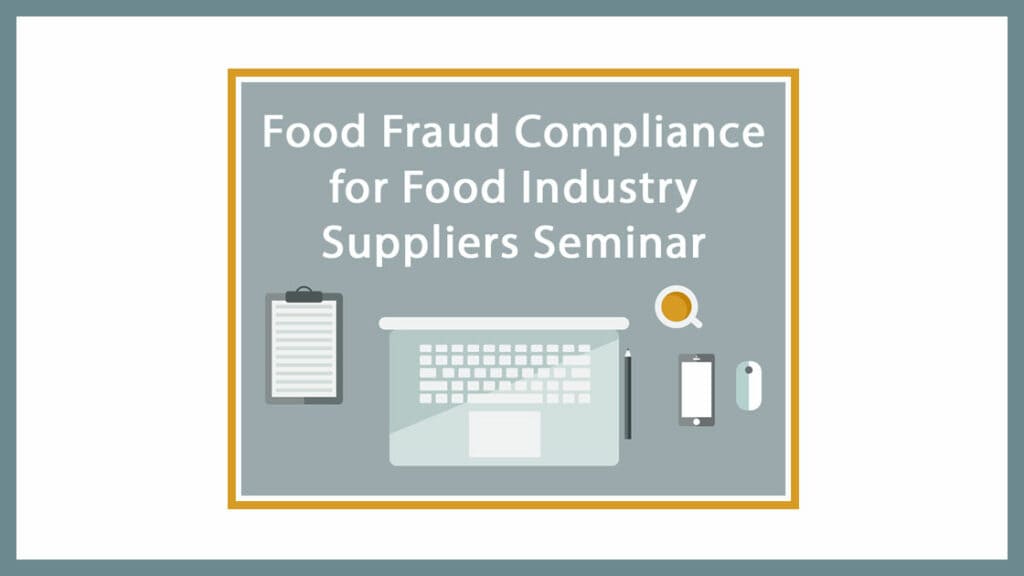If you sell products or services into the food industry then – at least to some degree – you have a food fraud compliance requirement. This new seminar provides a simple and direct focus on the compliance requirements for suppliers to the food industry.
Key focus categories include: Packaging, Storage and Transportation, Pest Control, Cleaning Services/ Laundry, and related processing aids.
Attendees: Food industry suppliers of non-food products or manufacturing-related services. This includes food manufacturer attendees who provide these services to their own company (e.g., the packaging department of a food manufacturer).
Event Registration (virtual attendance option available): https://foodfraudpreventionthinktank.com/course-product/suppliers-october-24-2023/
. . . . . . . . . .
Food Fraud Compliance for Food Industry Suppliers Seminar: October 24-25, 2023, in East Lansing
Instructor: John W Spink, Ph.D.
Why Attend:
- Receive direct, live instruction that enables classroom and side bar discussions on company specific questions.
- Attendees can direct the examples and case studies to their specific industries.
- This includes live instruction from Dr. Spink.
- The registration includes a post-course, half-hour virtual office hours meeting with Dr. Spink.
- Be confident in your understanding of how to fully comply with the Food Safety Management System certification requirements.
Deliverables:
- An overview of the food fraud prevention compliance requirements for non-food suppliers to the food industry (Packaging, Storage and Transportation, Pest Control, Cleaning Services/ Laundry, and related processing aids).
- An understanding of how the requirements apply to your operations or activities.
- A roadmap for completing your food fraud vulnerability assessment and food fraud prevention strategy requirements.
- A Certificate of Completion.
Background:
Essentially, any company that provides products or services to the food industry is considered a ‘food industry supplier.’ There are specific food safety requirements for laws, regulations, standards, certifications, and customer requirements. For example, the Global Food Safety Initiative (GFSI) benchmark (which is implemented through Food Safety Management System standards such as BRC/ BRCGS, FSSC 22000, SQF, IFS, and others) has specific requirements for food industry suppliers. Stakeholder categories for non-food suppliers include:
- Food Packaging
- Food Safety Services (“packaging, water supply, pest control, cleaning services/ laundry, waste disposal”)
- Storage and Distribution Services (“storage facilities and distribution vehicles”)
- Production of Chemicals and Bio-Cultures used as food ingredients or processing aids in food production.
- Food Broker/ Agent
- Retail/ Wholesale
Future Events: The seminar/workshops in this Supplier series run on a six month schedule.
The food fraud professional education courses were first offered in April 2009. Over the years, they have evolved to address the shifting food fraud compliance requirements. The courses have also expanded to include new topics such as the Food Fraud Initial Screening tool (FFIS), the Food Fraud Prevention Cycle (FFPC), and Enterprise Risk Management (ERM/ COSO).
The Food Fraud Prevention Professional Education resources include the MOOC programs (free, massive open online courses), the Blog series (short, regular updates on food fraud and related topics), Resources (video lectures, primer documents, Food Fraud Insight Reports, etc.), and Professional Education Events (seminars, workshops and webinars). The Events are conducted live and are either in-person or online.
Takeaway Points
- Beyond the MOOC online courses, the live, in-person Professional Education courses provide an interactive and personal training experience, with real-world deliverables.
- The Food Fraud Prevention Academy course catalog is coordinated so that the different programs complement each other and are calibrated to support capacity-building and capability-building – in your company, more employees will more thoroughly understand this topic.
- Review your Food Fraud Prevention education and training needs and consider the Professional Education courses for you or your employees.

